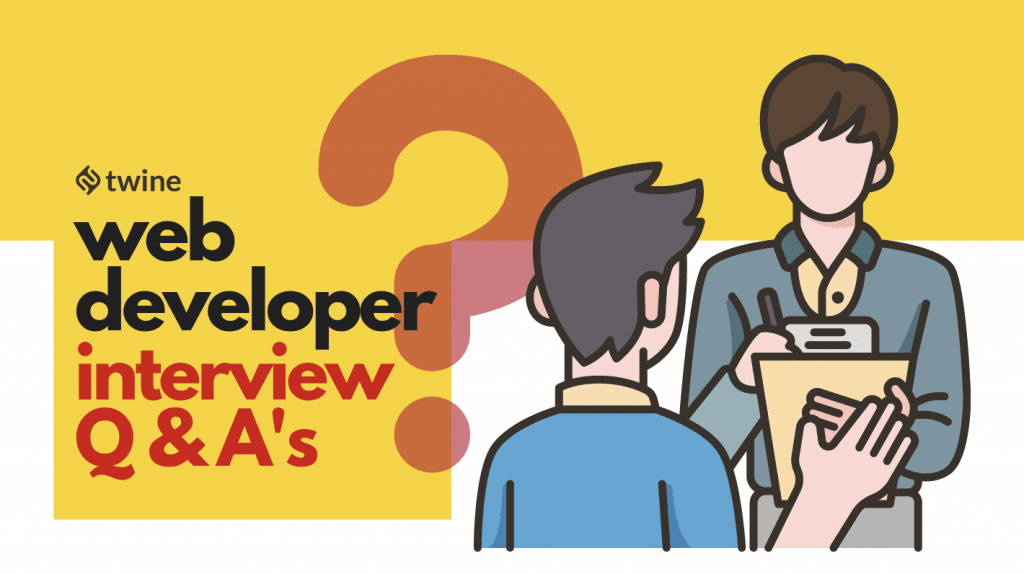
For more Web Tools, check out the Freelancer Toolkit…
Since Web Development has lifted off to be a multi-billion dollar market, businesses left, right, and center are racing to fill tech positions and establish the optimum online presence for their bottom line. That’s how things work in the Information Age: if you are not in Google, it’s almost like you don’t even exist. Getting those web developer interview questions right, is essential…
So, yes: website builders are a hot commodity these days, and the demand only continues to grow. However, the increased competition has made the recruitment process for the job just a tiny bit more challenging.
But, not to worry! Whether you’re an interviewer or interviewee, Twine has put together a list of some of the most common Web Developer interview questions to help you prepare.
Ready to join a global community of web developers? Browse 1000’s jobs, posted daily, here on Twine…
What are the top interview questions for web developers?
When hiring for this role, employers want someone with the right qualifications, disposition, and enthusiasm to thrive in the position. Therefore, to identify the right person for the team, they’ll ask questions that assess candidates’ hard skills, behavioral intelligence, and soft skills.
Top hard skills interview questions

1. What coding languages are you familiar with?
To learn more about your technical knowledge and abilities, employers will ask you about the number and the types of programming languages you’re familiar with, as well as other web development tools and processes.
Candidates should be honest about their strengths and weaknesses but also exhibit their eagerness to learn and improve.
Depending on your level of seniority, this number will increase. However, if you are not an expert in every language, be honest about it – especially if a particular program isn’t relevant to the day-to-day work of the role. Make sure to review the job description again and prioritize whichever programming languages that company uses. Besides that, as long as you have a baseline of technical coding skills, are interested in learning, and are actively working on developing new skills, you should be good.
2. How would you explain ____ to someone with no tech background?
These kinds of questions screen for not only technical experience but also the candidate’s ability to communicate. Companies need someone who can interact effectively with other non-techie team members and guide clients through processes. Qualified candidates will thoroughly understand a given concept, use simple terms, and avoid talking too fast while trying to get their point across.
Employers will test candidates’ technical experience and communication skills.
MVC, Responsive design, AWS, APIs, Microservices architecture, JavaScript, HTML, push technology, Big-O Notation, Type Coercion, website building platforms, etc., are only some of the terms and concepts that may come up during the interview. Other than that, you may also be asked to differentiate between HTML and XHTML, an undefined value and a null value, span and div tag in HTML5, ID and Class selector, black box and white box testing, etc.
3. Name a website or app you like. What’s appealing about it?
The answer to this question offers a glimpse into the candidate’s awareness of the industry, level of interest in good websites and development, and appreciation for the nuances of good web design and functionality. In contrast, asking them to name one that annoys them and reasons why can show the candidate’s problem-solving abilities. Employers will be fishing for specific answers and points of discussion. So, the candidates should focus on certain development concepts like UX, load times, navigation, usability, etc.
A web developer always thinks like one while looking at other sites, which is why they shouldn’t have a problem pointing to some they find top-notch, the ones that they don’t, and how they can be improved.
4. As a Web Developer, how would you…?
Employers will put candidates’ knowledge to the test, asking them to explain how they would apply their skills for various tasks or problems. For instance, they may ask about a candidate’s workflow, approach, and/or process regarding the creation of a web page or web application, time management, but also the site’s SEO, maintainability, UX design, performance, accessibility, security, testing for bugs, etc. If possible, the candidates should try to provide real-world examples and do their best to illustrate how they applied their skills to the hiring managers.
Top behavioral interview questions

1. Describe a time you have received negative feedback. How did you deal with it?
Behavioral interview questions reveal more about your past behavior, how you’ve handled different situations, and how it may translate into the current position. This specific question is crucial because everyone will love every website a developer creates. They may receive criticism from their colleagues and clients. Still, an ideal candidate will handle these scenarios with patience and professionalism. Moreover, they’ll use negative feedback to devise a solution and improve.
A similar question would be: What’s your approach to conflict management on your team?
2. Did you ever get stuck while coding? If yes, did you manage to work your way through the problem, and how?
At one point or another, your new hire will run into walls. It’s an inherent part of the job. Still, how they handle the situation says a lot about their experience, character, and problem-solving skills. According to the WP Full Care team that focuses on building a strong website in their blog posts, an ideal candidate will be able to show that they handle challenges with patience and a positive attitude. In their answer, they should show ample experience handling challenging situations and demonstrate their keen problem-solving skills.
A similar question would be: Tell me about a time when your program didn’t run. What did you do?
3. What’s your favorite development project to date?
Employers may ask their candidates to describe a project they’re particularly proud of. These questions discover the kind of sites a candidate might enjoy creating, their development process, working style, and how passionate they are about their field.
It’s not hard to notice when someone is passionate about what they do, so one of the web developer interview questions should be directed at this topic.
Therefore, someone looking to land a job as a web developer should strive to provide a detailed answer about their preferences and reasons why they love their job. Body language, such as energetic hand gestures and enthusiasm in their voice, says a lot about a candidate.
A similar question would be: Was there a project that didn’t turn out the way you wanted? What changes would you make?
How to test developers for soft skills

1. How do you keep up with the latest industry news and trends?
Given the fast-changing field, applicants must be ready to show they can keep up and are committed to continuous learning. This question tests that. They’ll typically talk about their favorite web development blogs and vlogs, YouTube channels, social media influencers, thought leaders, and more to show how passionate a candidate is about the development industry. Great candidates are also likely to mention their preferred programming websites and top website platforms and even express their interest in taking courses to update their skillset regularly.
2. What would you say is the essential soft skill for a web developer?
The interviewees tend to answer with a skill they possess. Therefore, the next on our list of web developer interview questions will allow an insight into a candidate’s aptitude, values, how they see themselves, and their approach to their chosen career. There’s no right or wrong answer to this one. However, employers will naturally look for answers that align with the company values. So, they might fish for responses highlighting valuable traits such as teamwork, patience, leadership, etc.
3. How would you describe your ideal development environment?
A candidate’s answer to this question helps employers test for collaboration and teamwork. Employers will want to learn whether applicants like working in a team or independently. Of course, both preferences are perfectly valid. Yet, the person asking the questions will want to see what a person is like in a collaborative scenario, what they think contributes to a successful team, etc.
Employers like to know if a candidate is comfortable working in a group.
Additional personal web development questions for a job interview…
Other personal questions that help employers spot a good overall fit for the company include:
- Tell us more about yourself.
- What kind of projects are you working on/have you worked on in your free time?
- Where do you see your career in five years?
- What made you decide to pursue coding?
- Why are you interested in this career?
- What are some of your interests outside this field?
Wrapping up
A broad range of web developer interview questions may arise during recruitment. These are only some of the most common ones. Hopefully, we’ve given you an idea of what you should do or expect. These questions should help you find the most qualified candidates with exceptional tech skills and strong interpersonal qualities – precisely what a company needs to deliver a top-notch digital experience. Likewise, doing your best to prepare for this interview will help you showcase your best qualities and skill set. It will boost your chances of standing out in the sea of qualified candidates. Best of luck!
Ready to get hired? At Twine, we have dozens of top-quality jobs being posted each and every day. From design to marketing, development to copywriting – there’s a job ready for your skills. Join the marketplace of diverse creative talent here.








